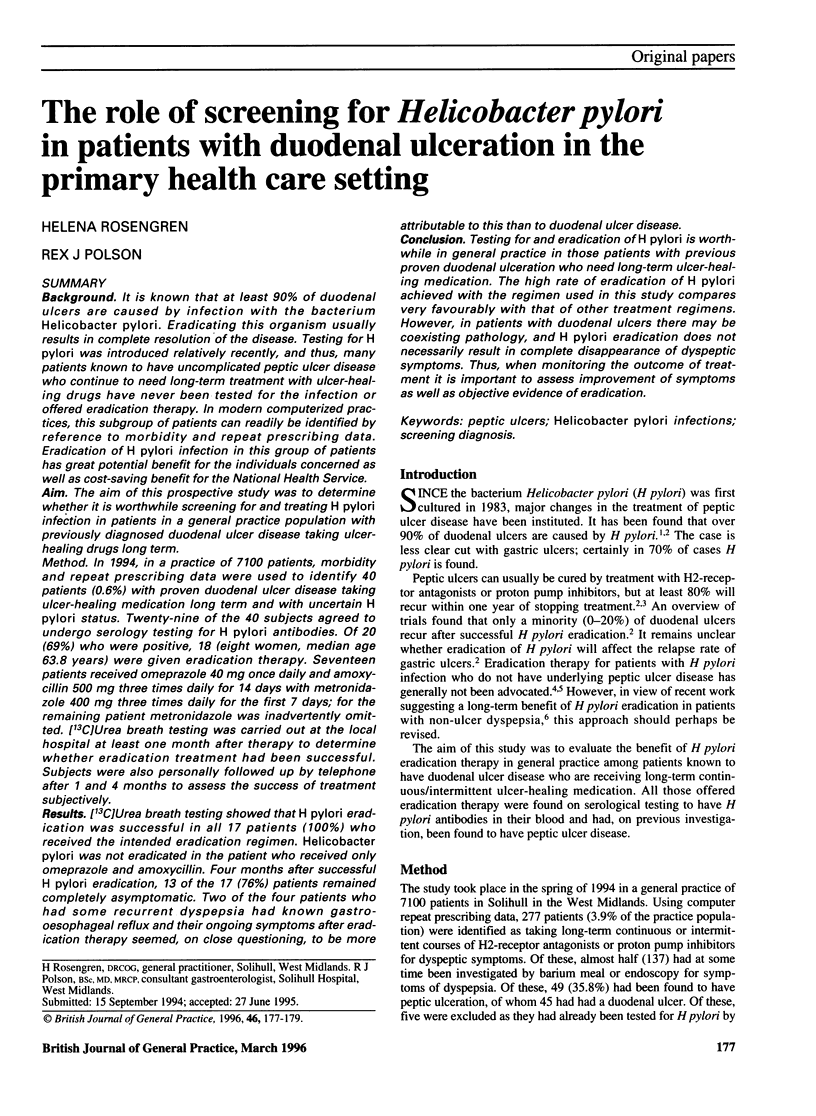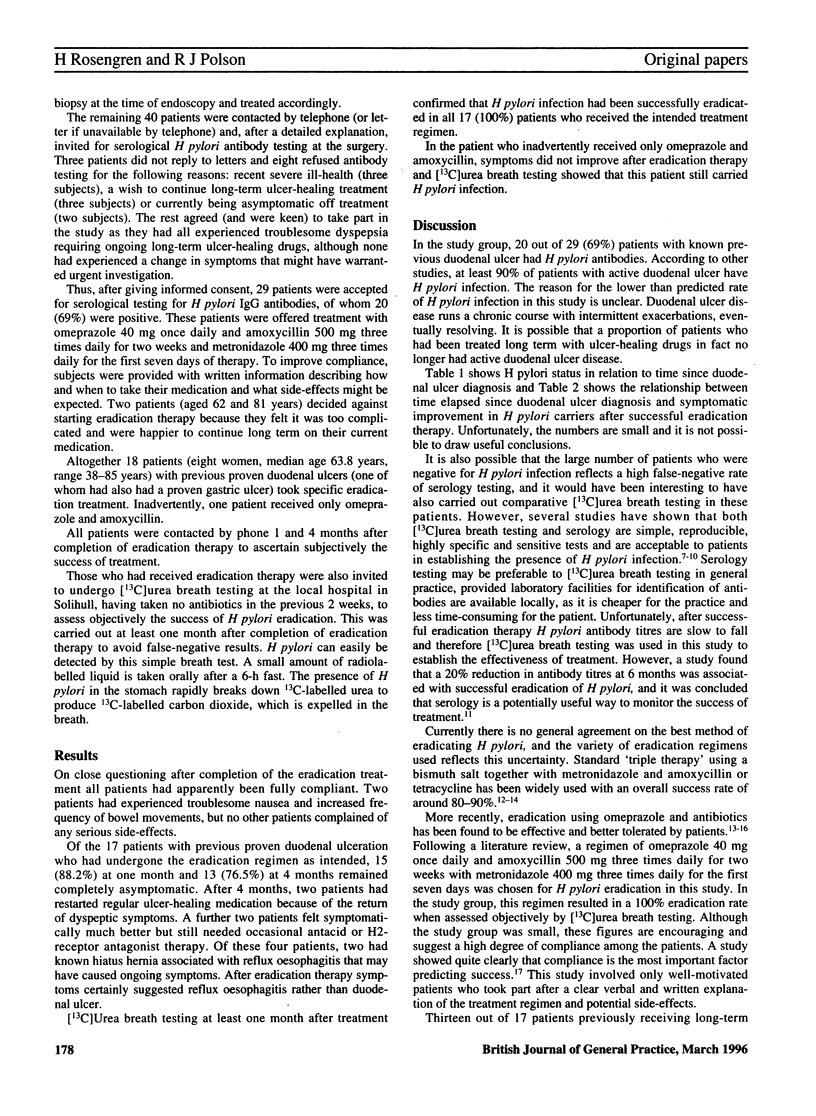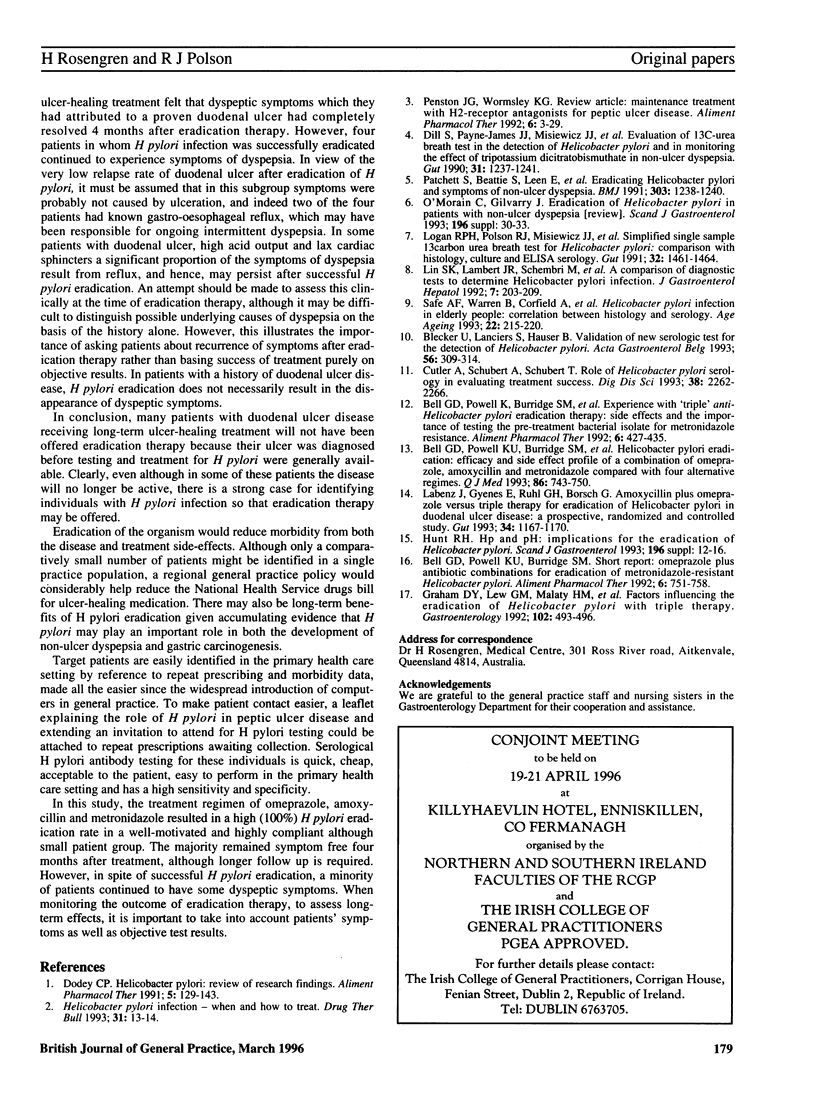Abstract
BACKGROUND: It is known that at least 90% of duodenal ulcers are caused by infection with the bacterium Helicobacter pylori. Eradicating this organism usually results in complete resolution of the disease. Testing for H pylori was introduced relatively recently, and thus, many patients known to have uncomplicated peptic ulcer disease who continue to need long-term treatment with ulcer-healing drugs have never been tested for the infection or offered eradication therapy. In modern computerized practices, this subgroup of patients can readily be identified by reference to morbidity and repeat prescribing data. Eradication of H pylori infection in this group of patients has great potential benefit for the individuals concerned as well as cost-saving benefit for the National Health Service. AIM: The aim of this prospective study was to determine whether it is worthwhile screening for and treating H pylori infection in patients in a general practice population with previously diagnosed duodenal ulcer disease taking ulcer-healing drugs long term. METHOD: In 1994, in a practice of 7100 patients, morbidity and repeat prescribing data were used to identify 40 patients (0.6%) with proven duodenal ulcer disease taking ulcer-healing medication long term and with uncertain H pylori status. Twenty-nine of the 40 subjects agreed to undergo serology testing for H pylori antibodies. Of 20 (69%) who were positive, 18 (eight women, median age 63.8 years) were given eradication therapy. Seventeen patients received omeprazole 40 mg once daily and amoxycillin 500 mg three times daily for 14 days with metronidazole 400 mg three times daily for the first 7 days; for the remaining patient metronidazole was inadvertently omitted. [13C]Urea breath testing was carried out at the local hospital at least one month after therapy to determine whether eradication treatment had been successful. Subjects were also personally followed up by telephone after 1 and 4 months to assess the success of treatment subjectively. RESULTS: [13C]Urea breath testing showed that H pylori eradication was successful in all 17 patients (100%) who received the intended eradication regimen. Helicobacter pylori was not eradicated in the patient who received only omeprazole and amoxycillin. Four months after successful H pylori eradication, 13 of the 17 (76%) patients remained completely asymptomatic. Two of the four patients who had some recurrent dyspepsia had known gastro-oesophageal reflux and their ongoing symptoms after eradication therapy seemed, on close questioning, to be more attributable to this than to duodenal ulcer disease. CONCLUSION: Testing for and eradication of H pylori is worthwhile in general practice in those patients with previous proven duodenal ulceration who need long-term ulcer-healing medication. The high rate of eradication of H pylori achieved with the regimen used in this study compares very favourably with that of other treatment regimens. However, in patients with duodenal ulcers there may be coexisting pathology, and H pylori eradication does not necessarily result in complete disappearance of dyspeptic symptoms. Thus, when monitoring the outcome of treatment it is important to assess improvement of symptoms as well as objective evidence of eradication.
Full text
PDF


Selected References
These references are in PubMed. This may not be the complete list of references from this article.
- Bell G. D., Powell K. U., Burridge S. M., Bowden A. N., Rameh B., Bolton G., Purser K., Harrison G., Brown C., Gant P. W. Helicobacter pylori eradication: efficacy and side effect profile of a combination of omeprazole, amoxycillin and metronidazole compared with four alternative regimens. Q J Med. 1993 Nov;86(11):743–750. [PubMed] [Google Scholar]
- Bell G. D., Powell K. U., Burridge S. M., Spencer G., Bolton G., Purser K., Brooks S., Prosser S., Harrison G., Gant P. W. Short report: omeprazole plus antibiotic combinations for the eradication of metronidazole-resistant Helicobacter pylori. Aliment Pharmacol Ther. 1992 Dec;6(6):751–758. doi: 10.1111/j.1365-2036.1992.tb00740.x. [DOI] [PubMed] [Google Scholar]
- Bell G. D., Powell K., Burridge S. M., Pallecaros A., Jones P. H., Gant P. W., Harrison G., Trowell J. E. Experience with 'triple' anti-Helicobacter pylori eradication therapy: side effects and the importance of testing the pre-treatment bacterial isolate for metronidazole resistance. Aliment Pharmacol Ther. 1992 Aug;6(4):427–435. doi: 10.1111/j.1365-2036.1992.tb00556.x. [DOI] [PubMed] [Google Scholar]
- Blecker U., Lanciers S., Hauser B. Validation of a new serologic test for the detection of Helicobacter pylori. Acta Gastroenterol Belg. 1993 Sep-Dec;56(5-6):309–314. [PubMed] [Google Scholar]
- Cutler A., Schubert A., Schubert T. Role of Helicobacter pylori serology in evaluating treatment success. Dig Dis Sci. 1993 Dec;38(12):2262–2266. doi: 10.1007/BF01299906. [DOI] [PubMed] [Google Scholar]
- Dill S., Payne-James J. J., Misiewicz J. J., Grimble G. K., McSwiggan D., Pathak K., Wood A. J., Scrimgeour C. M., Rennie M. J. Evaluation of 13C-urea breath test in the detection of Helicobacter pylori and in monitoring the effect of tripotassium dicitratobismuthate in non-ulcer dyspepsia. Gut. 1990 Nov;31(11):1237–1241. doi: 10.1136/gut.31.11.1237. [DOI] [PMC free article] [PubMed] [Google Scholar]
- Dooley C. P. Helicobacter pylori: review of research findings. Aliment Pharmacol Ther. 1991;5 (Suppl 1):129–143. doi: 10.1111/j.1365-2036.1991.tb00756.x. [DOI] [PubMed] [Google Scholar]
- Graham D. Y., Lew G. M., Malaty H. M., Evans D. G., Evans D. J., Jr, Klein P. D., Alpert L. C., Genta R. M. Factors influencing the eradication of Helicobacter pylori with triple therapy. Gastroenterology. 1992 Feb;102(2):493–496. doi: 10.1016/0016-5085(92)90095-g. [DOI] [PubMed] [Google Scholar]
- Hunt R. H. Hp and pH: implications for the eradication of Helicobacter pylori. Scand J Gastroenterol Suppl. 1993;196:12–16. doi: 10.3109/00365529309098335. [DOI] [PubMed] [Google Scholar]
- Labenz J., Gyenes E., Rühl G. H., Börsch G. Amoxicillin plus omeprazole versus triple therapy for eradication of Helicobacter pylori in duodenal ulcer disease: a prospective, randomized, and controlled study. Gut. 1993 Sep;34(9):1167–1170. doi: 10.1136/gut.34.9.1167. [DOI] [PMC free article] [PubMed] [Google Scholar]
- Lin S. K., Lambert J. R., Schembri M., Nicholson L., Finlay M., Wong C., Coulepis A. A comparison of diagnostic tests to determine Helicobacter pylori infection. J Gastroenterol Hepatol. 1992 Mar-Apr;7(2):203–209. doi: 10.1111/j.1440-1746.1992.tb00963.x. [DOI] [PubMed] [Google Scholar]
- Logan R. P., Polson R. J., Misiewicz J. J., Rao G., Karim N. Q., Newell D., Johnson P., Wadsworth J., Walker M. M., Baron J. H. Simplified single sample 13Carbon urea breath test for Helicobacter pylori: comparison with histology, culture, and ELISA serology. Gut. 1991 Dec;32(12):1461–1464. doi: 10.1136/gut.32.12.1461. [DOI] [PMC free article] [PubMed] [Google Scholar]
- O'Moráin C., Gilvarry J. Eradication of Helicobacter pylori in patients with non-ulcer dyspepsia. Scand J Gastroenterol Suppl. 1993;196:30–33. doi: 10.3109/00365529309098340. [DOI] [PubMed] [Google Scholar]
- Patchett S., Beattie S., Leen E., Keane C., O'Morain C. Eradicating Helicobacter pylori and symptoms of non-ulcer dyspepsia. BMJ. 1991 Nov 16;303(6812):1238–1240. doi: 10.1136/bmj.303.6812.1238. [DOI] [PMC free article] [PubMed] [Google Scholar]
- Penston J. G., Wormsley K. G. Review article: maintenance treatment with H2-receptor antagonists for peptic ulcer disease. Aliment Pharmacol Ther. 1992 Feb;6(1):3–29. doi: 10.1111/j.1365-2036.1992.tb00541.x. [DOI] [PubMed] [Google Scholar]
- Safe A. F., Warren B., Corfield A., McNulty C. A., Watson B., Mountford R. A., Read A. Helicobacter pylori infection in elderly people: correlation between histology and serology. Age Ageing. 1993 May;22(3):215–220. doi: 10.1093/ageing/22.3.215. [DOI] [PubMed] [Google Scholar]


